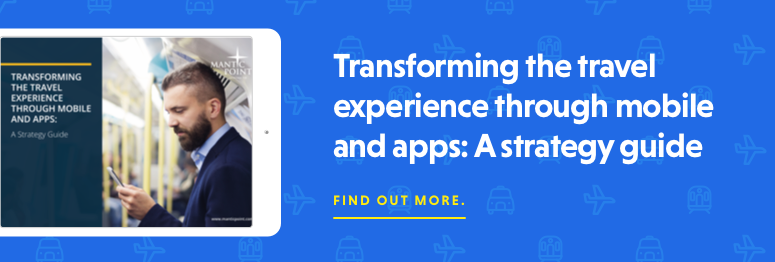What do mobile apps by GDS companies offer TMCs?
Posted by Mike Atherton on 09 September, 2015

How effective are GDS mobile offerings for TMCs?
With the recent acquisition of MTT by TravelPort, all the major GDS' now have a travel itinerary app offering. However, unlike their retail counterparts, TMCs have specific needs from a mobile service, which include policy compliance, traveller profile and risk management, along with all the usual itinerary management requirements.
So what are the pros and cons for a TMC choosing a GDS mobile application?
Benefits of GDS-owned mobile apps
- By using a product controlled by a GDS there’s less to consider in terms of design and functionality. If your agency doesn’t see mobile as a differentiator (from other agencies on the same GDS) or promoting your brand and services isn’t a requisite for your client base, then implementing a GDS app saves a lot of effort.
- Usually it’s free to offer GDS-owned, branded apps to your customers – as a one size fits all approach there should be no cost. GDSs also offer varying capabilities of white-labelling and customisation to support your brand, usually with an associated cost. It’s always worthwhile reviewing the details of what constitutes ‘white-label’ from a GDS.
- The apps from the major GDS players will all have tight integration with their respective GDS cores. This means that trip details can be automatically synced to the traveller’s device with zero touch for the consultant and no effort for the traveller once they’ve registered for the service.
Drawbacks of GDS-owned mobile apps
- GDSs don’t like to play with each other, so if you’re a multi-GDS agency, how do you project a consistent service experience? Even if your agency uses a single GDS, how will you cope with off-GDS bookings? Adding passive segments to the PNR is one approach, but then you need to ensure the GDS mobile app will handle passives in the way you require.
- Why give you hard-earned traveller away? Post-booking merchandising is becoming increasingly important to revenue growth for TMCs. When the agency doesn’t control the communication channel and gives away the crucial traveller data and access to the GDS, the GDS company is in a position to merchandise based on their objectives, not the agency’s.
- Strategically focusing on travel apps is missing the direction the GDSs are moving in. Most GDSs find it difficult to control the agency booking environment and whilst their merchandising capabilities are always improving, there is a great incentive for agencies to invest in other booking platforms. A major objective of the GDS mobile approach is to circumvent their lack of control over the point of sale and go directly to the traveller with rich merchandising content. Whilst the agency might have a short-term gain for reusing GDS mobile infrastructure, they suffer long-term pain from even more revenue leakage.
- It’s always worth checking what customisation options are available with GDS-owned applications. For small and mid-tier TMCs there may be little option but to take the ‘vanilla’ GDS offering, which is unlikely to accommodate agency requirements on personalisation and brand projection.
- GDS companies, as back office, transactional service providers by definition, do not focus on traveller experience technologies. Adopting one of their mobile apps means you have to accept technology advancements will be made in their own time, and across a braod range of agency requirements leading to typically slow innovation. It’s also debatable how responsive they can be to the rapid innovation curve we’ve seen in mobile. Also, from our experience, GDSs treat technologies as silos, whereas today travellers expect seamless multichannel experiences, across mobile, email and social.
These factors, which stem from lack of control over the traveller conversation, all impact upon the true cost of using GDS-owned technology to offer customers a mobile option for itinerary management.
At Mantic Point we strongly believe that it is essential for TMCs to control the post-booking conversation with clients and travellers. If your agency shares this belief and you're interested in controlling the post-booking conversation with the traveller and client across mobile, document delivery, merchandising and travel risk management, with high levels of personalisation, then it would be great to talk.


